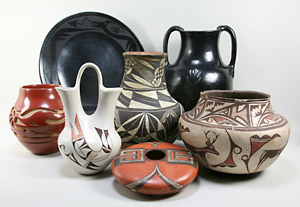Your valuable possessions should be documented and evaluated before a loss due to theft or natural disaster. After a loss occurs, it may be difficult or impossible to accurately identify and receive full compensation for your property.

Image courtesy Medicine Man Gallery
Why Do I Need an Appraisal?
An appraisal protects your financial interests:
- If you under-insure your art and antiques, you may not be fully compensated in case of disaster.
- If you over-insure, you are throwing money away with every premium payment.
- When filing with the IRS, you must be able to justify charitable deductions or an estate value in case of an audit.
- You want to avoid paying too much for something you buy, and be sure you receive a fair price for something you sell.
- If you have inherited part of an estate or are party in a divorce, you want to be sure to receive your fair share.
A professional appraiser helps protect your interests by providing a written value determination on which you can base your financial decisions.
Professional appraisals require recognized methods of valuation, careful market research, and accurate identification of your personal property. Because appraisal reports are legal documents used by accountants, attorneys, estate planners, executors, banks, insurance companies, courts, and the IRS, anything less than a competent, professional appraisal puts you at risk.

Image courtesy Medicine Man Gallery
A professional appraisal may be required for:
- Insurance coverage or claims
- Estate planning and trusts
- Tax deduction for charitable contributions
- Equitable distribution of estates
- Equitable distribution in divorce
- Informed buying and selling
- Estate or gift tax liability
- Tax deduction for casualty loss
- Liquidation of assets
- Loan collateral
Questions to Ask an Appraiser
Protect your interests by working only with accredited appraisers. Personal property appraisers are not regulated by federal or state governments, so it is up to you to evaluate an appraiser’s qualifications.
What qualifies you to appraise my property?
A qualified appraiser has formal education in appraisal theory, principles, procedures, ethics, and law. The appraiser should be up to date on the latest appraisal standards. Continuing education and testing are the only ways to ensure this competence.

Image courtesy Medicine Man Gallery
The appraiser you hire should be familiar with the type of property you want appraised and know how to value it correctly. However, expertise on a particular type of property is not enough if the “expert” does not know how to evaluate an item for its appropriate worth and the intended use of the appraisal. Without appraisal training, these “experts” have no way of understanding the complicated variety of marketplace definitions that are used to determine appropriate values.
For example, a museum curator may be able to authenticate a work of art, or a jeweler may be able to price a gemstone, but neither may have any knowledge of the principles and procedures that are required for an appraisal that is defensible with the IRS or the courts.
Do all appraisers have similar qualifications?
No! There are many self-named personal property appraisers who have not completed any professional education.
It is important to ask the prospective appraiser what type of formal appraisal education training he or she has received. Obtaining a copy of the appraiser’s professional profile or resume can help you evaluate the appraiser’s credentials. Neither state nor federal governments license or regulate personal property appraisers, so the burden is on the consumer to evaluate an appraiser’s qualifications.
Do you belong to an appraisal society that tests its members? Have you been tested? Do you take continuing education classes?
Membership in a professional association is important because it shows that the appraiser is involved with the profession, has peer recognition, has access to updated information, and is subject to a code of ethics and conduct.

Image courtesy Medicine Man Gallery
There are many appraisal organizations, but only a few require members to take courses and pass tests before being admitted as full members. International Society of Appraisers (ISA) is such an organization.
If the appraiser claims membership in a group that trains and tests its members, be sure to ask if this appraiser has personally gone through the training and testing. Some organizations have grandfathered members into high member status without testing them.
Continuing education is also important for appraisers. Procedures and regulations are always changing. Because of this, ISA constantly updates, expands, and rewrites its courses to ensure that its members will perform the work you need with knowledge of all the latest professional standards.
How will you handle items that may be outside your specialty area?
No appraiser can claim expertise in everything. ISA recognizes over 230 areas of specialty knowledge. A good appraiser knows his or her limits, and is expected to consult with other experts when necessary.
What is your fee and on what basis do you charge?
Do not hire an appraiser who charges a percentage of the appraised value, a percentage of the anticipated tax deduction, or any other fee contingent on a particular financial outcome. These practices clearly are conflicts of interest and may result in inaccurate values. The IRS will not accept an appraisal done with such fee arrangements.
ISA appraisers are prohibited by their Code of Ethics and the federally endorsed Uniform Standards of Professional Appraisal Practice from charging a fee based on the value of the property being appraised. Only hourly fees, flat rates, or per item charges are acceptable.
What will the appraisal report be like?
You should receive a formal, typewritten report that gives you the information that meets your specific needs, presented in a way that is complete, organized, and easy to understand.
Some appraisal societies only teach appraisal theory, with no “real life” examples. ISA is the only major appraisal society in the United States that specifically trains its members in how to write standardized, comprehensive appraisal reports. Each accredited member has been tested on these standards.
From the International Society of Appraisers
Michael Ettema, ISA • 6 Casa del Oro Way • Santa Fe, NM 87508 • 505.231.8293 • mettema56@gmail.com • michael@artappraisalsofsantafe.com

